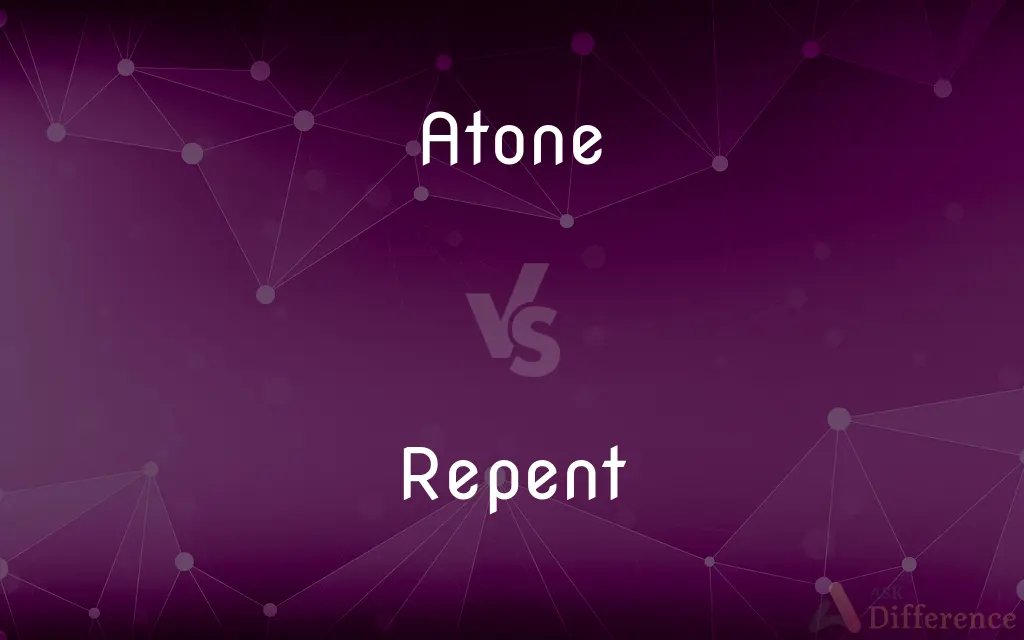Atone vs. Repent — What's the Difference?

Difference Between Atone and Repent
ADVERTISEMENT
Definitions
Atone
To make amends, as for a sin or fault
These crimes must be atoned for.
Repent
To feel remorse, contrition, or self-reproach for what one has done or failed to do; be contrite
"[He] liked to visit prisoners and admonish them to repent of their ways" (Adam Hochschild).
Atone
(Archaic) To agree.
Repent
To feel such regret for past conduct as to change one's mind regarding it
Repented of intemperate behavior. You'd better accept their offer before they repent.
Atone
To expiate.
ADVERTISEMENT
Repent
To become a more moral or religious person as a result of remorse or contrition for one's sins.
Atone
(Archaic) To conciliate; appease
"So heaven, atoned, shall dying Greece restore" (Alexander Pope).
Repent
To feel regret or self-reproach for
Repent one's sins.
Atone
(Obsolete) To reconcile or harmonize.
Repent
(Archaic) To cause (one or oneself) to feel remorse or regret
"And it repented the Lord that he had made man on the earth" (King James Bible).
ADVERTISEMENT
Atone
(ambitransitive) To make reparation, compensation, amends or satisfaction for an offence, crime, mistake or deficiency.
Repent
Prostrate or growing along the ground.
Atone
To bring at one or at concordance; to reconcile; to suffer appeasement.
Repent
(intransitive) To feel pain, sorrow, or regret for what one has done or omitted to do; the cause for repenting may be indicated with "of".
Marry in haste, repent at leisure.
Atone
To agree or accord; to be in accordance or harmony.
Repent
To be sorry for sin as morally evil, and to seek forgiveness; to cease to practice sin and to love.
Atone
To unite in making.
Repent
(transitive) To feel pain on account of; to remember with sorrow.
Atone
(proscribed) To absolve (someone else) of wrongdoing, especially by standing as an equivalent.
Repent
(transitive) To be sorry for, to regret.
I repent my sins.
Atone
To agree; to be in accordance; to accord.
He and Aufidius can no more atoneThan violentest contrariety.
Repent
To cause to have sorrow or regret.
Atone
To stand as an equivalent; to make reparation, compensation, or amends, for an offense or a crime.
The murderer fell, and blood atoned for blood.
The ministry not atoning for their former conduct by any wise or popular measure.
Repent
To cause (oneself) to feel pain or regret.
Atone
To set at one; to reduce to concord; to reconcile, as parties at variance; to appease.
I would do muchTo atone them, for the love I bear to Cassio.
Repent
Creeping along the ground.
Atone
To unite in making.
The four elements . . . have atonedA noble league.
Repent
Prostrate and rooting; - said of stems.
Atone
To make satisfaction for; to expiate.
Or each atone his guilty love with life.
Repent
Same as Reptant.
Atone
Make amends for;
Expiate one's sins
Repent
To feel pain, sorrow, or regret, for what one has done or omitted to do.
First she relentsWith pity; of that pity then repents.
Atone
Turn away from sin or do penitence
Repent
To change the mind, or the course of conduct, on account of regret or dissatisfaction.
Lest, peradventure, the people repent when they see war, and they return to Egypt.
Repent
To be sorry for sin as morally evil, and to seek forgiveness; to cease to love and practice sin.
Except ye repent, ye shall likewise perish.
Repent
To feel pain on account of; to remember with sorrow.
I do repent it from my very soul.
Repent
To feel regret or sorrow; - used reflexively.
My father has repented him ere now.
Repent
To cause to have sorrow or regret; - used impersonally.
Repent
Turn away from sin or do penitence
Repent
Feel remorse for; feel sorry for; be contrite about

















































